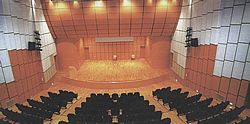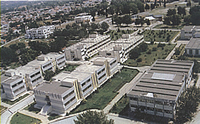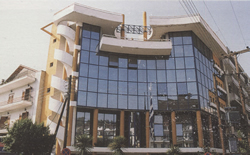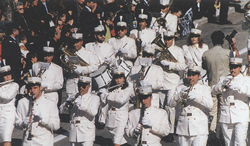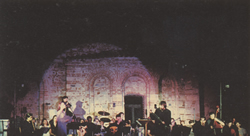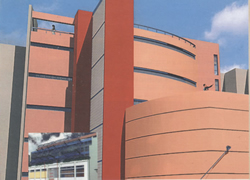POPULATION THE WORK PLACE
A break-down of the employment of the economically active population of the city of Serres reveals a significant skew towards the service sector; specifically trade, haulage, communication, banking, and insurance. Light industry is second in importance, and has enjoyed rapid development of late, especially in the processing of agricultural produce, which is directly linked to local farming production. The main processing plant in the area is that of the Hellenic Sugar Industry. The city's industrial zone is of vital importance for economic development in the area. The industrial zone was set up by ETBA in 1981 to the north-west of the city. It covers 1.2 square kilometres. A number of dynamic new industrial plants have recently moved into the industrial area, including DROMEAS and FLOS.Primary production, however, is in constant decline. This is seen as a natural consequence of the fact that alternative forms of occupation now exist for the urban population, who naturally prefer to work close to their homes in the city. Primary production in Serres and its environs centres on the growing of fruit and vegetables.
TRANSPORTATION
The city's railway station lies on the south-south western outskirts of the city, and is on the main Thessaloniki-Alexandroupoli-Turkey road.The city is also only a short distance away from one of the country's major road junctions. The main Thessaloniki-Serres and Thessaloniki-Sidirokastro-Bulgaria highways cross at Lefkoma, a little to the west of the city, on the main Serres-Drama road. The main Thessaloniki-Sidirokastro-Bulgaria highway is constructed to very high standards and the fact that it is a limited access motorway permits vehicles to attain high speeds and for high traffic volumes to be dealt with. To the south-east of the city, at Mesorachis, a branch off the main Serres-Drama road leads to the highway connecting Thessaloniki with the Turkish border.
Furthermore, the prefecture's national and regional road networks allow the commercial activities of more than merely local importance that have developed in the city of Serres itself to spread into the surrounding area. Hence, both the national road linking Serres and Thessaloniki, and the regional road joining Serres to Nigrita are lined with commercial dealerships, supermarkets, and refrigerated warehouses.Bus services connect the city of Serres with the prefecture's other main centres. There are services to even the most remote hamlet within the prefecture. Coaches also run between Serres and the capitals of the neighbouring prefectures of Thessaloniki, Drama and Kavala, as well as Athens.City buses serve the city of Serres and its environs.
EDUCATION
There are a number of public, municipal and private day nurseries in the city of Serres, as well as numerous nursery school, twenty four primary schools, one special school, one school for the deaf and dumb, six high schools, five general senior high schools, one musical high / senior high school, three technological institutes, one evening high / senior high school, and two institutions of higher education: the Serres T.E.I., and the TEEÖÁ - the Sports Academy of the Aristotelian University of Thessaloniki.The Serres Technological Educational Institute (T.E.I.) was founded in the city as a Centre of Higher Technical and Professional Training (K.A.T.E.E.) before becoming the Serres T.E.I. in 1983. It has been housed in high specification premises belonging to the T.E.I. itself in the southern outskirts of the city since 1993.
The site incorporates the Faculty of Management and Economics, the Faculty of Technological Applications, as well as buildings housing workshops, the college administration, a multi-purpose hall, and the library. The 4,000 or so students studying at the Serres TEI play an active part in city life, enriching it with new ideas and points of view, as well as strengthening the city economically.The Physical Education and Sports Department of the Aristotelian University of Thessaloniki (ÔÅÅÖÁ) was set up in Serres in 1985. Some 500 students study there. The ÔÅÅÖÁ organises a number of conferences, seminars, symposiums, exhibitions, and sports events both on its own account and in co-operation with local bodies such as ÄÅÐÊÁ and the Municipality of Serres. The presence of the Sports Department and the young men and women studying there is particularly important as well as beneficial for the city of Serres.
HEALTH
The Serres General Prefectural Hospital serves the inhabitants of the entireprefecture. It is now housed in a new building on the main Serres-Drama road, a little to the south-west of the city. There are also a number of private clinics in the area.
CULTURE
PRESS - MEDIA
The cultural life of Serres is considered to be particularly active, and encompasses the theatre, music, the visual arts, dance, and the written word. The Municipality plays a hugely significant role in the city's cultural life via the Municipal Enterprise for Cultural and Social Development (Ä.Å.Ð.Ê.Á.) which operates both on its own account and in co-operation with parallel private bodies. Special attention is paid by Ä.Å.Ð.Ê.Á. to the outlying areas of the city, where it maintains local cultural centres offering courses in, among other things, pottery, mosaic-making, painting and computing.The city has had its own Municipal Regional Theatre (ÄÇ.ÐÅ.ÈÅ.) since 1984, which is part of a nation-wide network of regional theatres and is jointly funded by the Ministry of Culture and the Municipality of Serres. It is housed in the historic building of the city's oldest cultural association, ÏÑÖÅÁÓ. The theatre plays a particularly important role not only in the cultural life of the city, but of the region as a whole. The existence of amateur theatrical groups in the city is proof of the vibrancy of this artform in the city.
A number of Serres' citizens concern themselves with the visual arts, both professionally and as amateurs. There are also a number of private galleries in the city, as well as one public gallery which is housed in the Ä.Å.Ð.Ê.Á. head office.The city's musical life is a reflection of the interest and sensitivity displayed by its citizens. There is a Municipal band, and a number of other groups, primarily choirs, organised by other bodies. The Serres Musical Workshop (a private non-profit making organisation) is particularly active both within and beyond the prefecture of Serres. Members of the Maximian Spiritual Foundation of the Diocese of Serres have been involved in traditional and Byzantine music since the 1990s. Furthermore, a public musical high / senior high school has been in operation in the city since 1994, offering a musical education to pupils from throughout the prefecture. There are also a number of private musical schools.There are numerous cultural associations in Serres. The oldest of them all, ÏÑÖÅÁÓ, has been playing its part in the city's cultural life since 1905, and played a historic role in the city's liberation in 1913.
The Serres Cultural Association has also been a constant presence in the city for many years, while the Society of the Friends of Literature and the Arts has played a significant role in the fields of music, the written word, and the theatre.Another important cultural presence in the city is that of the associations of the city's various ethnic groups - the Greeks of Thrace, the Black Sea, and Asia Minor; the Sarakatsani and the Vlachs, among others. Their activities are in line with the nature of the customs and traditions of their various homelands. The Serres Girls' Lycee has also concerned itself with the folk traditions of the region and Greece as a whole since 1957.The Serres Central Municipal Library was established during the 1950s. It is one of the best organised Public Libraries in the country, with over 50,000 books. Over 40,000 people use the library, and over 85,000 books are lent per year. Its collections cover the whole spectrum of human knowledge.
The Central Municipal Library plays an active part in the city's cultural activities, hosting talks, exhibitions, book presentations, literary retrospectives, and seminars. It is also very active in the field of publishing via its series of publications entitled, "Publications on the city and prefecture of Serres".
Finally, the library is also involved in the organisation of educational programmes in archaeology, ecology and other related fields, as well as literary seminars focusing on Greek and foreign literature. There is also a mobile unit which serves the reading needs of Serres' rural population.The General State Archives - Prefectural Archives of Serres play a significant role in the prefecture's cultural life. Constituting a regional, cross-prefecture department of the General State Archives, the General State Archives - Prefectural Archives of Serres have been operational in the city of Serres since September 1992. Their mission is to supervise, salvage, collect, conserve, record, collate and catalogue the prefecture's archive material. In addition to the functions for which they were established, the Prefectural Archives of Serres also provide a valuable service to both local and foreign researchers, many of whom visit our city. Lastly, the archives are not only of interest to specialised researchers; they are a source of valuable knowledge to anyone interested in local history.
Serres has a long history of publications. A host of publications of various kinds have existed in the city since the start of the Twentieth Century. Today, there are more than 10 daily and weekly newspapers in circulation. The oldest newspaper is the PROODOS, which has been in circulation since 1929. Two periodicals - "META" and "GIATI" - have enjoyed unbroken publication and national importance since their launch in 1995 and 1978 respectively. Especially important are the two periodical publications of scientific and cultural content. It's about SERRAIKA ANALEKTA, published by D.E.P.K.A. the cultural enterprise of the Municipality of Serres and SIRIS, which is published by the association of philologists of the prefecture of Serres.
There are also a number of local radio stations and television channels.
Writer:
Dimitra Tsesmetzi-Maragaki


